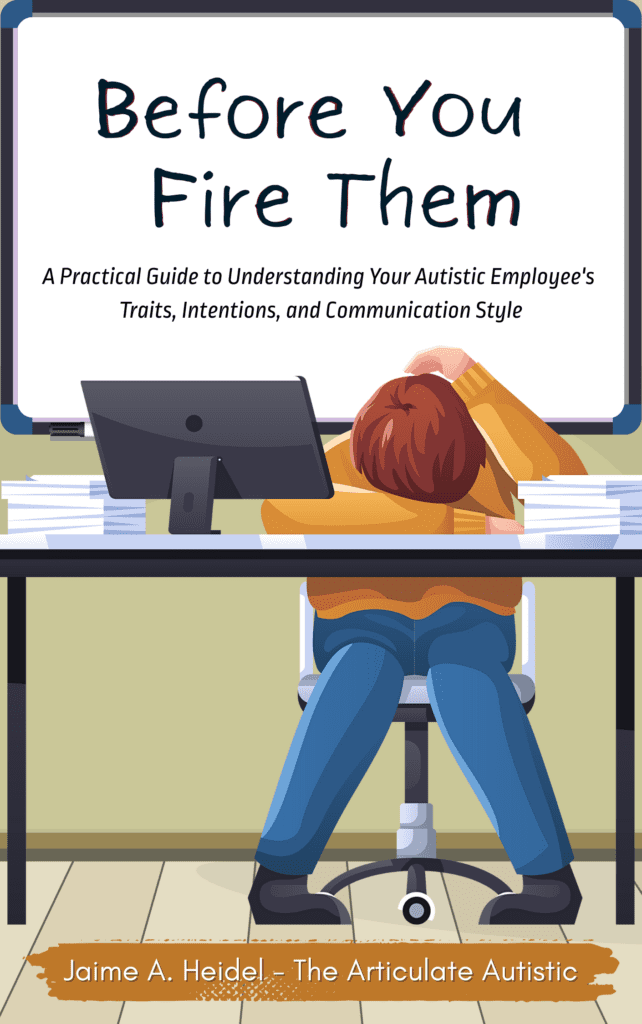“Why Is My Autistic Employee So Rude?”

If you’ve ever asked yourself, “Why is my autistic employee so rude?”, you’re not alone. As a neurotypical (non-autistic) person, it can be easy to misunderstand your autistic employee’s intentions, as their communication style and behavior differ from what you’re used to.
Here are some common autistic traits you may misinterpret as purposeful rudeness:
- Direct Speech
While neurotypical (non-autistic) people automatically prioritize social relationships when they speak with others, autistic people tend to prioritize accurate information exchange.
That doesn’t mean your autistic employee doesn’t consider others, but rather, they genuinely don’t see how hinting or talking around a problem is necessary or helpful.
They’ll likely tell you in plain, direct language if something is wrong and needs addressing. They don’t intend to be offensive or hurtful, but rather call out the issue so it can be dealt with quickly and efficiently.
- Correcting Inaccurate Information
Another challenge you may run into when managing your autistic employee is that they frequently correct you or others whenever they encounter inaccurate information. Since neurotypical people often do this to be purposefully condescending, you’d be forgiven for thinking your autistic employee has the same intention.
However, that’s usually not the case. The autistic brain is wired to think literally and prioritize accurate information exchange. Therefore, when someone makes an error, say, during a follow-up meeting or training seminar, the inconsistency will hit your autistic employee’s brain like an electric jolt, and the impulse to dispel the sudden anxiety this causes may prompt them to interrupt with a hasty correction.
- Doesn’t Greet Others
You may have noticed that your autistic employee tends to skip greetings at the beginning of the workday, preferring to clock in and go to their desk immediately. While this behavior can come across as rude or anti-social to the neurotypical observer, that’s usually not the intention.
Neurotypical brains are wired to prioritize social connection, and greeting one another and engaging in small talk is a common way to reestablish professional bonds each day. Autistic brains, on the other hand, tend to maintain previously established camaraderie without needing to engage in these social rituals.
Also, greetings, small talk, and other social rituals can be confusing and energy-draining experiences for your autistic employees.
- Declines After-Work Functions
As I mentioned in the previous section, polite socializing, while as easy as breathing for you as a neurotypical person, can be a draining and exhausting effort for your autistic employees.
If they decline invitations to hang out after work, they’re not trying to be rude; they’re trying to conserve their energy and reduce sensory overload.
Being allowed to return home to decompress without social or professional repercussions is a no-cost way to accommodate your autistic employees while providing a much-needed sense of psychological safety.
- Answers Questions Honestly
Another potential source of ‘rudeness’ you may come across when managing and training an autistic employee is when they answer your questions honestly.
As their supervisor, your neurotypical employees automatically defer to you based on the unspoken rules of social hierarchy. You’re the boss, they’re the employee; therefore, what you say is correct, and your choice is final.
However, when you have an autistic employee, when you ask a question, you’re more likely to get an honest answer that is not filtered through this hierarchical lens because our brains don’t automatically operate based on social hierarchy!
The good news is, you’ll get honest feedback even when everyone else is saying “yes, man” or “yes, ma’am”. The bad news is, you may be offended by what you perceive to be disrespect and insubordination.
The Takeaway
Autistic people, including me, have spent a lifetime being accused of being rude when what we’re really being is neurodivergent. When it comes to your autistic employee, there’s no malicious intent, no secret grudge, and no hidden agenda when we interact (or don’t) with you. We act and communicate according to how our brains are wired.
Since these and other common misunderstandings often lead to write-ups, demotions, and sudden termination of employment, I wrote a book to help you, as a neurotypical supervisor, better understand your autistic employee, so you can not only keep them but help your company thrive with them!
It’s called Before You Fire Them – A Practical Guide to Understanding Your Autistic Employee’s Traits, Intentions, and Communication Style.

Looking for more purchasing options? I published through IngramSpark, which is distributing my book globally. The rollout for the paperback is slow, but the eBook is available in several other places. A quick Google search should help you find it in your area. 🙂


